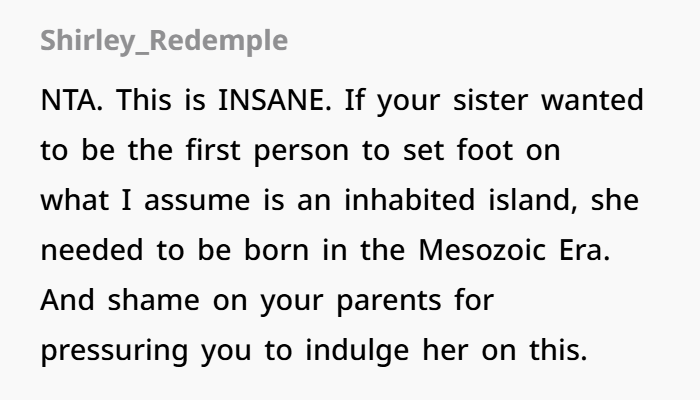Woman Refuses To Change The Destination Of Her And Her BF’s Getaway After Learning Sister “Plans” To Spend Her Honeymoon There
The OP’s sister has long been fixated on creating the perfect wedding experience—one that’s entirely unique and special to her. She has envisioned every detail, including an unbooked yet planned honeymoon at a specific tropical destination. When OP’s boyfriend surprised her with an anniversary trip to the same location (unbeknownst to him or OP), things took a dramatic turn. The sister claimed that OP vacationing there first would rob her honeymoon of its magic, demanding that OP cancel or change her plans. Despite the boyfriend’s willingness to accommodate, OP feels this demand is unreasonable and refuses to comply, leading to threats of being uninvited from the wedding and pressure from their parents to relent.
At its core, this conflict highlights the tension between personal entitlement and family expectations, leaving OP questioning whether her refusal to change plans makes her stubborn or justified.
Read for more info Reddit
Bride-to-be makes a fuss about sister’s anniversary trip location because it coincides with her honeymoon destination
The woman asks her sibling to cancel or change the getaway destination and threatens to remove her from the wedding if she won’t do so








The sister’s belief that OP vacationing at her “planned” destination first would ruin its specialness reveals a strong sense of ownership over a shared experience. This behavior is often seen in individuals who overly idealize events like weddings. Psychologically, this mindset stems from a phenomenon called territorial behavior—the tendency to claim emotional ownership over intangible things, like memories, plans, or ideas. However, in this situation, the sister has no actual ownership of the destination (having not booked or even officially announced her plans). This raises the question: Can someone truly claim exclusivity over a public place or idea?
In similar situations, entitlement over experiences is often at the heart of the conflict. For instance:
- Shared Honeymoon or Wedding Ideas: Cases exist where one sibling feels wronged when another has a similar wedding venue, dress style, or honeymoon destination. Legally, such claims hold no weight, as no one has ownership over creative choices or geographic locations.
- Social Dynamics and Specialness: Weddings often amplify feelings of rivalry or comparison. The sister’s concern about losing the “specialness” of the honeymoon likely comes from the fear that someone else will associate the destination with OP rather than her, threatening her perception of the perfect, unique experience.
Case Precedents:
While anecdotal examples dominate this type of situation, culturally significant vacations or life events can cause disputes. For instance:
- Destination Conflicts in Families: It’s common for families to argue when multiple members want to visit the same location (like Disney World) at different times. The resolution generally involves recognizing that public destinations cannot be monopolized.
- Influence of Surprise Trips: Surprise plans often mitigate responsibility. In this case, OP’s boyfriend acted independently, with no intent to hurt the sister. This removes the “malicious intent” factor, making the sister’s demands appear irrational.
From a psychological standpoint, the sister’s insistence reflects her fixation on control. According to family dynamics research, individuals who place high importance on their weddings may sometimes project insecurities onto others. Her desire to “protect” the uniqueness of her honeymoon might actually be rooted in anxiety about comparisons or a perceived loss of control over her narrative.
Navigating Family Pressures and Boundary-Setting
The family dynamics add another layer of complexity. The sister’s threat to disinvite OP from the wedding and the parents’ pressure to “keep the peace” are emotionally manipulative tactics that place the burden solely on OP. This aligns with triangulation, a family system behavior where two parties (sister and parents) unite against one member (OP) to resolve tension.
- Boundary-Setting: OP’s stance—refusing to cancel her trip—demonstrates healthy boundary-setting. Boundaries are critical in maintaining self-respect and preventing resentment.
- Conflict Resolution: While the sister might feel wronged, compromise is not reasonable here, as the trip was not planned to spite her. Accepting the boyfriend’s offer to change destinations could set a precedent for further unreasonable demands in the future.
Fellow community members shared their thoughts and opinions on the situation






OP is not the AH for refusing to change her vacation plans. Her sister’s entitlement to a public destination is irrational, and OP’s boyfriend’s thoughtful gift deserves appreciation, not cancellation. While family pressure to “keep the peace” is understandable, it would come at the cost of OP’s autonomy and fairness. Healthy boundaries and an understanding that no one can “own” a location are key takeaways here.




